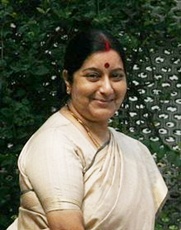China, Russia back India for UN Security Council, APEC
03 Feb 2015
India on Monday secured greater support from China and Russia for its bid for a permanent seat on the United Nations Security Council (UNSC) even as the two welcomed India's participation in the Asia-Pacific Economic Cooperation (APEC).
 A joint communiqué issued on Monday by the foreign ministers of Russia, India and China at the end of the 13th Russia, India, China (RIC) meeting, the three called for a new world order and endorsed Beijing's plans to mark the 70th anniversary of the end of the Second World War.
A joint communiqué issued on Monday by the foreign ministers of Russia, India and China at the end of the 13th Russia, India, China (RIC) meeting, the three called for a new world order and endorsed Beijing's plans to mark the 70th anniversary of the end of the Second World War.
India will soon be a member of APEC, a powerful international grouping of 21 countries, including the United States and Japan, which promotes free trade among its members.
''India's participation in APEC has been welcomed by both China and Russia,'' external affairs minister Sushma Swaraj said at the end of the RIC foreign ministers' meeting on Monday.
Swaraj said she was pleased with the support she received on her proposal to revive negotiations at the United Nations on the Comprehensive Convention on International Terrorism, which found specific mention.
The meeting of the foreign ministers of the three nations in the Chinese capital comes just a week after US President Barack Obama made a high-profile visit to India, the success of which in part was due to the remnants of India's mistrust towards Beijing.
The three nations vowed to "build a more just, fair and stable international political and economic order" and a "multi-polar" world.
Russian foreign minister Sergey Lavrov said all states should be involved in creating "a modern security architecture" in the Asia-Pacific while his Chinese counterpart Wang Yi called for greater partnership among nations rather than alliances.
"We advocate the principle of partnership rather than alliance," Wang said.
The three nations also resolved to lend greater support to efforts to bring the commemoration of the end of the Second World War on the agenda of the United Nations General Assembly.
"We will be celebrating the 70th anniversary of the UN and the world's victory against fascism. This provides a great opportunity for countries in the world to cherish history and look forward to the future," Wang said.
Analysts, however, see China's eagerness to celebrate the end of the Second World War as an attempt to exert pressure on Japan, by reminding it of the disaster that the war brought to Japan.
China plans to hold a military parade in Beijing in September, to which Russian President Vladimir Putin is expected to be invited.
The Chinese side also opted to play down India-US joint statements on protection of freedom of navigation across the South China Sea, over which Beijing claims sovereignty. During his meeting with Sushma Swraj, Xi said Sino-Indian relationship had "entered a new stage".
"The two nations have to properly control their differences with patience, and the differences should not affect the overall picture of their relations," the China News Service quoted him as saying.
By hosting the two foreign ministers, China also expects to present a united international front as a counterbalance to Washington.
China, obviously, is seeking a bigger role in the global economy, winning support from Asia-Pacific economies for a wider free trade area that could rival US plans for the region.
China also aims to control financial markets through an Asian equivalent of west-backed UN institutions like International Monetary Fund and the World Bank.


















